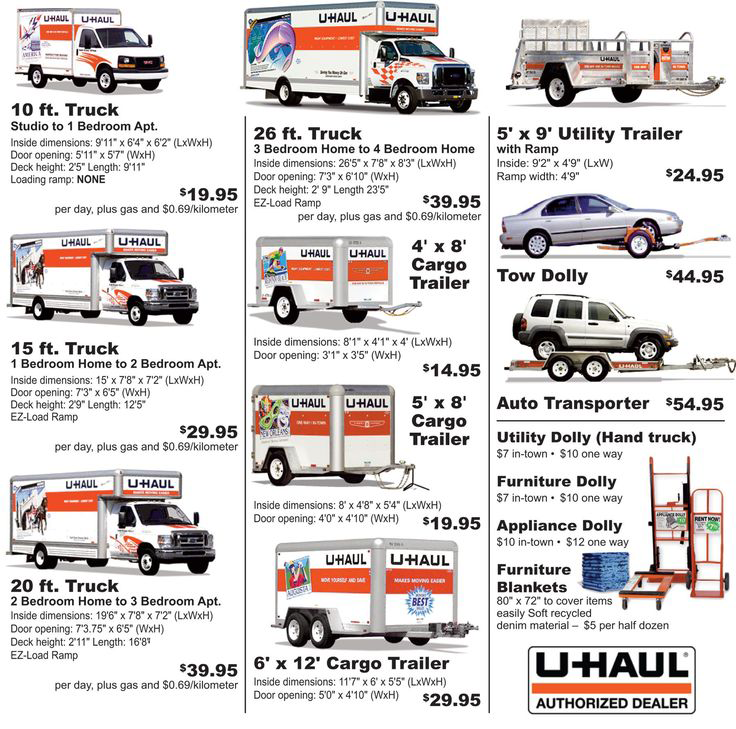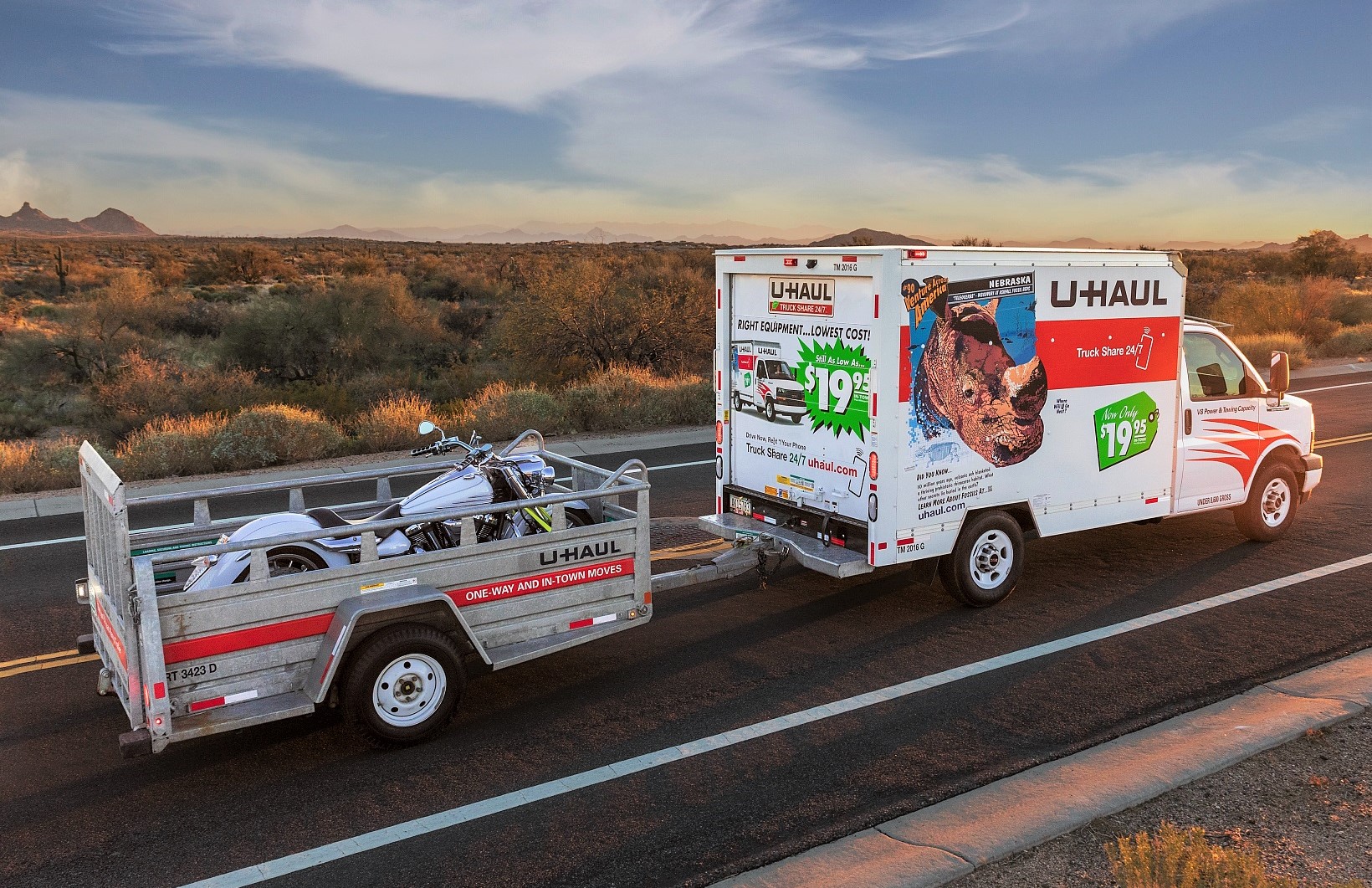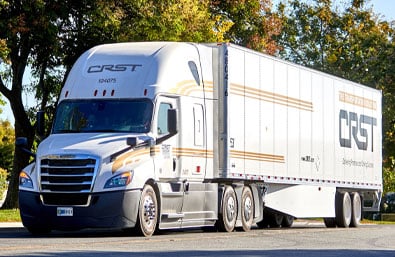Price Of Trailers From U-Haul?
Price Of Trailers From U-Haul? cars.truckstrend.com
Moving can be one of life’s most stressful events, but with the right planning and resources, it can be significantly smoother. For many, a crucial part of this process involves transporting belongings, and U-Haul stands as a dominant name in providing the necessary equipment. While U-Haul is widely recognized for its rental trucks, their extensive fleet of trailers offers a versatile and often more economical solution for various hauling needs. However, the question "What is the price of trailers from U-Haul?" isn’t straightforward. It’s a dynamic figure influenced by a multitude of factors, making it essential for prospective renters to understand the underlying mechanics of their pricing model.
This comprehensive guide aims to demystify U-Haul trailer pricing, providing you with the insights needed to make an informed decision, manage your budget effectively, and ensure a seamless moving or hauling experience. We will explore the different types of trailers available, the key variables that impact their cost, practical advice for securing the best rates, and important considerations before you hitch up and go.
Price Of Trailers From U-Haul?
Understanding U-Haul Trailer Types
U-Haul offers a diverse range of trailers designed to cater to various hauling requirements, from moving household goods to transporting vehicles or even just picking up some lumber. Understanding these types is the first step in estimating your potential costs, as pricing is fundamentally tied to the trailer’s size and function.
-
Cargo Trailers (Enclosed): These are the most common type for household moves, offering protection from weather and theft. They come in several sizes:
- 4′ x 8′: Ideal for small apartments, dorm rooms, or extra storage for a truck move.
- 5′ x 8′: Suitable for studio apartments or larger dorms, offering more cubic feet.
- 5′ x 10′: A popular choice for one-bedroom apartments or small homes, providing significant capacity.
- 6′ x 12′: The largest enclosed trailer, perfect for multi-bedroom homes or large moves, often featuring a low deck and ramp for easy loading.

-
Utility Trailers (Open): These open-top trailers are versatile for hauling various items, especially those that might be oversized or irregularly shaped, such as landscaping materials, construction debris, or motorcycles. They often come with sturdy ramps for easy loading.
- 4′ x 7′: Smallest utility trailer, good for light loads.
- 5′ x 8′: A common size for general hauling tasks.
- 5′ x 10′: Larger capacity for bigger projects.
- 6′ x 12′: The largest utility trailer, often used for heavier or bulkier items, including ATV’s or riding mowers.

-
Car Trailers (Vehicle Transport): If you need to move a car, U-Haul provides two primary options:
- Auto Transport: A full-sized trailer designed to carry the entire vehicle off the ground. Ideal for longer distances or vehicles that aren’t drivable.
- Tow Dolly: A two-wheel trailer that lifts the front wheels of the vehicle off the ground, allowing the rear wheels to roll on the road. More economical for shorter distances or when the vehicle is drivable.

Each trailer type serves a specific purpose, and their varying sizes directly correlate with their rental price, with larger and more specialized trailers generally costing more.
Factors Influencing U-Haul Trailer Pricing
The price you pay for a U-Haul trailer is not fixed; it’s a fluid figure determined by several interconnected variables. Understanding these factors is key to accurately estimating your costs and potentially finding ways to save money.
- Trailer Size: As mentioned, the larger the trailer, the higher the rental cost. This is the most straightforward pricing determinant.
- Rental Duration: U-Haul primarily offers daily rates for local (in-town) rentals. For one-way moves, you’ll be quoted a fixed price for a set number of days, with additional charges if you exceed that period. Longer rental durations naturally lead to higher overall costs.
- Rental Type (In-Town vs. One-Way):
- In-Town (Local) Rentals: These are typically cheaper. You pick up and return the trailer to the same U-Haul location. Pricing is often a simple daily rate.
- One-Way Rentals: These are generally more expensive and their pricing is highly dynamic. The cost is influenced by the distance of the move, the demand for trailers at both the pick-up and drop-off locations, and the availability of the specific trailer size you need. U-Haul’s algorithm optimizes pricing to balance equipment distribution across the country.
- Location (Pick-up and Drop-off): Prices can vary significantly based on the specific U-Haul center or dealer you choose, and the demand in that particular geographic area. Renting in a major metropolitan area during peak season might be more expensive than in a rural area during off-peak times.
- Time of Year/Demand: This is a major factor, especially for one-way rentals. Peak moving season (late spring through summer, especially June-August) and the end/beginning of the month see much higher demand, leading to increased prices. Renting during weekdays or off-peak seasons can result in substantial savings.
- Availability: If a particular trailer size is in high demand and low supply in your area, its price may be higher. Booking in advance can sometimes lock in a better rate and ensure availability.
- Add-ons and Optional Services:
- Insurance: U-Haul offers various coverage options like SafeTow (for the trailer itself) and SafeTrip (for you and your belongings). While optional, these add to the total cost.
- Hitches and Wiring: If your vehicle isn’t already equipped, you might need to purchase or rent a hitch, ball mount, and wiring harness from U-Haul, which are additional expenses.
- Moving Supplies: Boxes, tape, dollies, and furniture pads are often purchased at the same time and add to the overall cost, though they aren’t part of the trailer rental fee itself.
How to Get a Quote and Book a U-Haul Trailer
Getting an accurate quote for a U-Haul trailer is straightforward, primarily through their online platform.
-
U-Haul Website (Recommended): This is the easiest and most transparent way.
- Visit U-Haul.com.
- Select "Trailers" from the rental options.
- Enter your desired pick-up date, return date (if known), pick-up location, and drop-off location (if it’s a one-way move).
- The system will display available trailer sizes and their estimated prices for your specified criteria. You can often see daily rates for local moves and total estimated costs for one-way moves.
- Proceed with booking if the price is acceptable.
-
Phone: You can call the U-Haul reservation line. A representative can guide you through the options and provide a quote. This is useful if you have specific questions or unusual circumstances.
-
In-Person: Visit a local U-Haul center or authorized dealer. Staff can assist you with quotes and reservations, though prices are generally the same as online.
Always ensure you get a detailed quote that includes all fees and taxes before confirming your reservation. Remember that online quotes are typically the most up-to-date and reflect current availability and demand.
Tips for Saving Money on U-Haul Trailer Rentals
While U-Haul trailer pricing can fluctuate, there are several strategies you can employ to minimize your costs.
- Book in Advance: Especially for one-way moves or during peak season, booking several weeks or even months ahead can lock in better rates and ensure your desired trailer size is available.
- Be Flexible with Dates: If your schedule allows, try to avoid moving on weekends, holidays, or the last/first day of the month. Mid-week (Tuesday-Thursday) and mid-month rentals often come with lower prices due to reduced demand.
- Consider In-Town Rentals: If your move is local and you have access to a second vehicle or can make multiple trips, renting an in-town trailer and returning it to the same location can be significantly cheaper than a one-way rental.
- Optimize Trailer Size: Don’t overpay for space you don’t need. Accurately estimate the volume of your belongings. U-Haul provides helpful guides on their website to match trailer sizes to apartment or house sizes. Renting a slightly smaller trailer and making an extra trip (if local) could be more cost-effective.
- Check for Promotions: Periodically check the U-Haul website or sign up for their email list for any ongoing discounts or promotional offers.
- Understand Insurance Needs: Before opting for U-Haul’s insurance plans (SafeTow, SafeTrip), check with your existing auto insurance provider. Your policy might already offer coverage for rental trailers, potentially saving you money. However, ensure you fully understand your coverage limits and deductibles.
- Return on Time: Late returns can incur additional daily rental fees, quickly adding up. Plan your move to ensure you can return the trailer by the agreed-upon time.
- Ensure Towing Capability: Verify that your personal vehicle has the necessary towing capacity, a compatible hitch, and working trailer lights before you rent. Unexpected issues at pick-up could lead to delays or the need to rent a U-Haul truck instead, which is usually more expensive.
Important Considerations Before Renting
Renting a U-Haul trailer involves more than just selecting a size and paying a fee. Several critical factors must be considered to ensure a safe, legal, and hassle-free experience.
- Towing Vehicle Compatibility: This is paramount. Your vehicle must have a properly installed hitch receiver (Class I, II, III, or IV depending on the trailer size), a correctly sized hitch ball, and working wiring for the trailer’s lights (turn signals, brake lights, tail lights). U-Haul will inspect your vehicle before allowing you to leave with a trailer. They will not rent to you if your vehicle doesn’t meet their safety requirements.
- Towing Capacity: Check your vehicle’s owner’s manual for its maximum towing capacity. Never exceed this limit. Overloading can damage your vehicle, lead to unsafe driving conditions, and void insurance coverage. Remember to factor in the weight of the trailer itself (empty weight) plus your cargo.
- Weight Distribution: Proper loading is crucial for stability and safety. Distribute weight evenly, with approximately 60% of the cargo weight in the front half of the trailer (closest to the towing vehicle) and 40% in the rear. Secure all items to prevent shifting during transit. U-Haul provides loading guides to assist with this.
- Insurance Options: While not legally required in all states, U-Haul’s SafeTow and SafeTrip are worth considering. SafeTow protects you from damage to the U-Haul trailer, while SafeTrip offers coverage for your belongings and roadside assistance. Weigh these against your existing insurance policies.
- Licensing and Regulations: Ensure your driver’s license is valid. While a special license isn’t typically required for U-Haul trailers in most states (as long as combined vehicle/trailer weight is under certain limits), it’s always wise to be aware of state-specific towing regulations, especially regarding speed limits for vehicles towing trailers.
- Pre-Rental Inspection: Before driving away, thoroughly inspect the trailer with the U-Haul representative. Check for existing damage, ensure tires are properly inflated, and verify that all lights (tail, brake, turn signals) are working. Document any pre-existing damage with photos or notes.
- Hidden Costs and Fees: While U-Haul is generally transparent, be aware of potential extra charges for late returns, excessive cleaning needed upon return, or damages not covered by insurance. Read your rental agreement carefully.
Estimated U-Haul Trailer Rental Prices (Illustrative)
It’s crucial to reiterate that the prices below are estimates only and can vary significantly based on the factors discussed above (location, demand, duration, one-way vs. local, time of year). For precise pricing, always obtain a direct quote from U-Haul.
| Trailer Type | Size (Length x Width) | Estimated In-Town Daily Rate Range | Estimated One-Way Rate Range (Illustrative for ~500 miles, 2-3 days)* | Typical Use Cases |
|---|---|---|---|---|
| Cargo Trailers | 4′ x 8′ | $14.95 – $24.95 | $80 – $180 | Dorms, small apartments, extra storage for truck move |
| (Enclosed) | 5′ x 8′ | $19.95 – $29.95 | $100 – $250 | Studio apartments, 1-bedroom apartments |
| 5′ x 10′ | $24.95 – $34.95 | $120 – $300 | 1-2 bedroom apartments, small homes | |
| 6′ x 12′ | $29.95 – $49.95 | $150 – $400+ | 2-3 bedroom homes, larger moves, commercial hauling | |
| Utility Trailers | 4′ x 7′ | $14.95 – $24.95 | Not typically available for one-way | Small hauling jobs, light materials |
| (Open) | 5′ x 8′ | $19.95 – $29.95 | Not typically available for one-way | General hauling, yard work, small furniture |
| 5′ x 10′ | $24.95 – $34.95 | Not typically available for one-way | Larger materials, light equipment | |
| 6′ x 12′ | $29.95 – $49.95 | Not typically available for one-way | Heavy materials, ATV’s, large equipment, motorcycles | |
| Car Trailers | Tow Dolly | $39.95 – $59.95 | $150 – $350+ | Front-wheel drive vehicles, shorter distances, drivable cars |
| (Vehicle Transport) | Auto Transport | $49.95 – $69.95 | $200 – $600+ | All vehicle types, longer distances, non-drivable cars |
Note on One-Way Rates: These are highly variable and can fluctuate daily based on demand and location. The ranges provided are illustrative for a medium-distance move (e.g., 500 miles over 2-3 days). Very long distances or high-demand routes could push these prices significantly higher. Utility trailers are generally only available for local (in-town) rentals.
Frequently Asked Questions (FAQ)
Q1: Do U-Haul trailers have mileage fees?
A1: No, U-Haul trailers do not have mileage fees. The rental price is a flat rate for the rental period. This is a significant difference from U-Haul trucks, which often have per-mile charges.
Q2: Can I rent a U-Haul trailer without a hitch on my vehicle?
A2: No. U-Haul requires your towing vehicle to have a proper hitch receiver, a correctly sized hitch ball, and fully functioning wiring for the trailer’s lights. They will inspect your vehicle before rental.
Q3: What kind of hitch do I need for a U-Haul trailer?
A3: The hitch ball size depends on the trailer. Most U-Haul trailers use either a 1-7/8" or 2" diameter hitch ball. Your vehicle’s hitch receiver also needs to be rated for the weight of the trailer and its cargo. U-Haul can help you determine the correct size if you’re unsure.
Q4: Is insurance required for U-Haul trailers?
A4: While U-Haul’s optional coverage plans (SafeTow, SafeTrip) are not legally mandatory, they are highly recommended. Your personal auto insurance may offer some coverage, but it’s crucial to confirm the extent of that coverage with your provider before declining U-Haul’s options.
Q5: Can I pick up a trailer early or return it late?
A5: Picking up early is usually only possible if the trailer is available and ready, and it might adjust your rental period. Returning late will almost certainly incur additional daily rental fees, so it’s best to stick to your agreed-upon return time.
Q6: What’s the difference between an auto transport and a tow dolly?
A6: An auto transport is a full-size trailer that lifts all four wheels of your vehicle off the ground, making it suitable for longer distances or non-drivable vehicles. A tow dolly lifts only the front two wheels, with the rear wheels remaining on the ground. Tow dollies are generally cheaper and better for shorter distances or front-wheel-drive vehicles.
Q7: How far in advance should I book a U-Haul trailer?
A7: For one-way moves or during peak seasons (summer, end of month), booking 2-4 weeks in advance is advisable to ensure availability and potentially secure better rates. For local, in-town rentals during off-peak times, a few days to a week in advance is usually sufficient.
Conclusion
The "price of trailers from U-Haul" is not a static figure but rather a dynamic calculation influenced by a combination of trailer type, size, rental duration, the nature of the rental (in-town vs. one-way), geographical location, and current demand. By understanding these key factors and employing smart planning strategies, such as booking in advance, being flexible with dates, and carefully assessing your needs, you can significantly impact your overall rental cost.
Beyond the financial aspect, ensuring your towing vehicle is compatible, understanding proper loading techniques, and considering insurance options are crucial steps for a safe and successful towing experience. U-Haul trailers offer a cost-effective and versatile solution for various hauling needs, but an informed approach is key to harnessing their benefits fully. With the right preparation, your U-Haul trailer rental can be a straightforward and efficient part of your next move or project.






